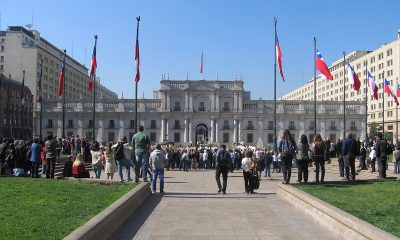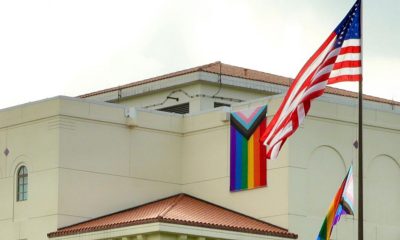News
La reivindicación de derechos y violencia contra LGBTQ marcan la crisis política en Chile
Activistas han participado en manifestaciones contra el gobierno de Piñera
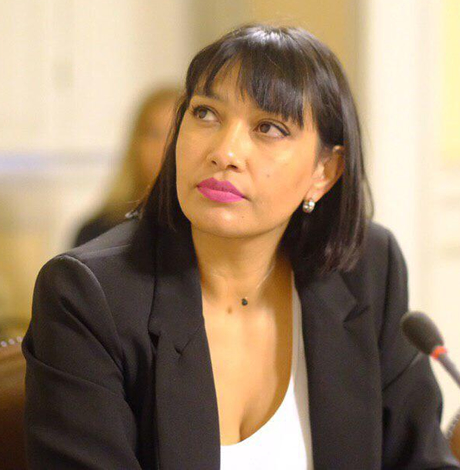
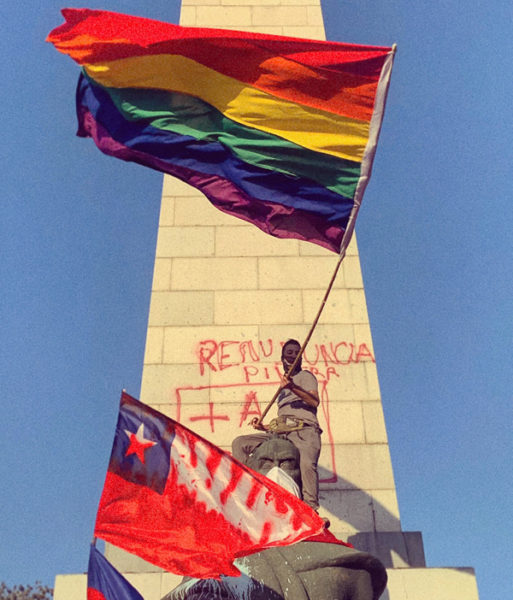
CONCEPCIÓN, Chile — En menos de tres días una manifestación convocada por estudiantes contra el aumento en las tarifas del metro se convirtió en una imponente e inesperada protesta nacional por años de desigualdades en Chile, paralizando al país por completo y poniendo en jaque a toda la clase política chilena. Millones de personas han salido a las calles en los últimos días para manifestar su descontento.
Sin embargo, algunas de las masivas marchas han terminado con manifestantes atacando negocios, incendiando y saqueando supermercados en la peor revuelta que se ha visto en el país en décadas. En respuesta, el presidente de Chile, Sebastián Piñera, decretó Estado de Emergencia sacando a los militares a las calles y sumó un toque de queda que profundizó el conflicto desencadenando en los peores episodios de violación de Derechos Humanos en los últimos 30 años en país latinoamericano. Un grupo de congresistas anunció el domingo una acusación constitucional contra Piñera.
“Estás semanas han sido una bomba de tiempo que todos sabíamos que iba explotar, pero no sabíamos que explotaría ahora y con esta intensidad”, dice Alessia Injoque, presidenta ejecutiva de Fundación Iguales, una organización LGBTQ chilena. Similar opinión tiene Franco Fuica, coordinador de legislación y políticas públicas de Organizando Trans Diversidades (OTD), “estamos viviendo una revolución social”, afirma.
La crisis en Chile, se arrastra hace mucho tiempo. En 1973 el dictador Augusto Pinochet realizó un golpe de Estado para derrocar a Salvador Allende, el primer presidente socialista electo democráticamente en América Latina. Pinochet dio marcha atrás al modelo de Allende y comenzó a implementar una fórmula económica diametralmente opuesta, el país se convirtió en una especie de laboratorio del neoliberalismo e inició una cruel dictadura que persiguió, torturó y mató a sus opositores.
Los cambios económicos de Pinochet fueron liderados por un grupo de economistas liberales educados en la Universidad de Chicago, donde aprendieron de las ideas de los estadounidenses Milton Friedman y Arnold Harberger, los “Chicago boys” implementaron reformas económicas y sociales que todo lo privatizó, las cuales fueron selladas en la Constitución Política de la República de Chile de 1980, que permanece vigente.
Chile es el único país en el mundo en que el agua es privada, las pensiones de jubilación son bajas, hay mala salud y la mayoría de los hogares tienen dificultades para llegar a fin de mes. Un informe publicado en enero de este año por la Comisión Económica de América Latina y el Caribe (Cepal), que analizó la evolución de la pobreza, el gasto y la inclusión social, reveló que Chile sigue manteniendo sus altos índices de desigualdad. “El 1 por ciento de la población concentra el 26,5 por ciento de la riqueza”, concluyó la investigación.
“Llevamos años en un sistema injusto, donde todo está hecho para que siempre ganen los mismos. Más allá de esa injusticia hubo impunidad, donde no pasó nada con personas que hicieron mucho daño, paso del dolor a la frustración, el gobierno fue indolente y todo reventó”, aclara Injoque. La activista trans sinceró haber sentir miedo “me dio escalofríos cuando supe que los militares saldrían a las calles” recuerda.
“Piñera le declaró la guerra a mis nietos por cadena nacional, mandó al Ejército a dispararles a matar por manifestar pacíficamente su enorme sufrimiento y al pueblo le está pareciendo que hay complicidad ahí y yo escuchó otra voz generalizada: ‘renuncia Piñera'”, dijo al Washington Blade, Pamela Jiles (Frente Amplio, una nueva fuerza política en el Congreso de Chile), quién ha liderado el impeachment.
“Mi deber como parlamentaria es acusar constitucionalmente a Piñera, como lo habría hecho la diputada humanista Laura Rodríguez, utilizando una atribución parlamentaria y un instrumento constitucional, de espaldas a la élite y de cara al pueblo”, explicó Jiles. “No puede ser de otro modo ya que ha puesto en grave peligro la seguridad de la nación, ha sumido el país en el desgobierno y es el principal -aunque no único- responsable de las muertes de quienes debía proteger”.
Desde el estallido de esta revolución social se han reportado brutales casos de violación a Derechos Humanos por las Fuerzas Armadas y de Orden chilenas. Represión, abuso de poder, violencia desmedida, detenciones ilegales y muertes alertaron a Michelle Bachelet, Alta Comisionada de Derechos Humanos en la Organización de Naciones Unidas (ONU) y expresidenta de Chile, por lo que decidió enviar un equipo de observadores a verificar los casos, entre ellos el de un joven homosexual detenido ilegalmente, torturado y abusado sexualmente por la policía.
Josué Maureira, estudiante de Medicina de la Pontificia Universidad Católica de Chile (PUC), fue detenido mientras entregaba primeros auxilios a manifestantes heridos, denunció que fue apaleado hasta quedar inconsciente, vejado por su orientación sexual y expresión de género, nuevamente golpeado hasta romperle el tabique nasal, violado con una porra, amenazado de muerte y encarcelado por supuestas agresiones a los carabineros. El Instituto Nacional de Derechos Humanos (INDH) presentó una querella por tortura sexual.
“Los Estados de Emergencia autorizan a restringir la libre circulación, pero no a atentar contra la vida de las personas. La ‘salida de la crisis’, como le gusta decir a la élite, será únicamente la salida de Piñera. Es nuestra obligación detener la matanza de inocentes”, subrayó Jiles.
Shane Cienfuegos, activiste y coordinadore del área de investigaciones de Colectiva Neutres, que en las últimas semanas ha logrado unificar a la mayoría de los grupos LGBTQ mencionó que “yo estoy en las calles desde la evasión del metro, activando los territorios.Convocamos a todas las organizaciones y llegaron más de 50, hicimos un diagnóstico y descubrimos que estábamos siendo vulnerades”.
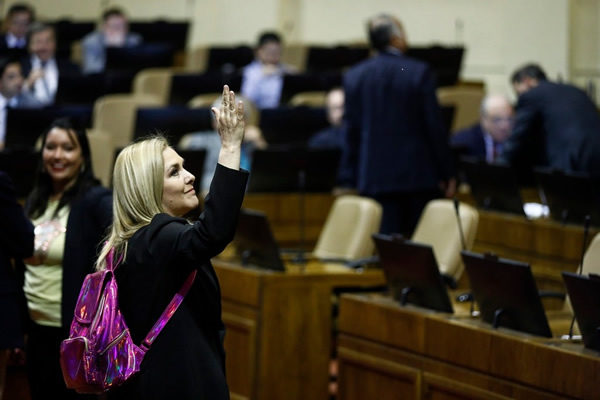
El pasado viernes 25 octubre se convocó a una masiva manifestación en todo el país, #LaMarchaMásGrandeDeChile fue trending topic mundial en Twitter y los canales de televisión cubrían la histórica protesta en cadena nacional, la cual que congregó a más de un millón y medio de personas. “Lo otro que iba a decir, que también hemos olvidado mencionar, aparte de los equipos -de fútbol- y las banderas chilenas, es muy importante, hay muchas banderas del movimiento LGBTQ, mucha gente también de la disidencia sexual que también están presentes y son movimientos que están manifestándose hoy día y sus banderas están ahí presentes en las calles”, interrumpió en vivo Mónica Rincón, periodista de CNN y aliada LGBTQ.
A través de sus redes sociales la mayoría de las instituciones LGBTQ chilenas llamaron a manifestarse. Mientras que las disidencias sexuales se desplegaron en grupo a participar. “Salimos con mucha pasión y creatividad para levantar con fuerza y al mismo tiempo reivindicar nuestros derechos que por siglos han sido vulnerados por el Estado de Chile y contra un sistema neoliberal que nos oprime”, añadió Cienfuegos.
En 1999 Chile despenalizó la sodomía, en 2012 sumó una ley antidiscriminación -la que los activistas apuntan como deficiente- y desde 2015 las personas del mismo sexo pueden acceder a una Unión Civil. En diciembre de este año entrará en vigencia la Ley de Identidad de Género que reconocerá el derecho a la identidad de las personas trans. A lo anterior, se suman políticas públicas que benefician a la diversidad sexual y de género, sin embargo, aún falta mucho para lograr la plena igualdad en el país.
“Conformamos una mesa con 19 organizaciones de la sociedad civil con presencia a lo largo de todo Chile, para poder trabajar en aquellas materias de ley que sean necesarias modificar para poder asegurar el reconocimiento, los derechos y las garantías de la población LGBTQ+”, mencionó Natalia Castillo (Frente Amplio), una joven congresista de la Cámara de Diputados que ha impulsado una bancada transversal por los derechos de lesbianas, gais, bisexuales, trans y queer, denominada “la bancada por la diversidad”.
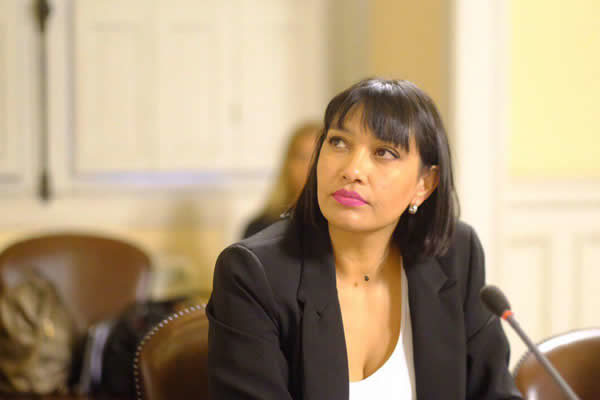
Hace más de un año el proyecto de ley de matrimonio igualitario duerme en la Comisión de Constitución del Senado. Por otro lado, la “bancada por la diversidad” levantada por Castillo trabaja en la elaboración de otras iniciativas legislativas a favor de la diversidad sexual y de género que serán presentadas en las próximas semanas.
“Yo creo que es una gran oportunidad de perfeccionar la ley antidiscriminación, promover una ley que penalice la incitación al odio, y quizás, este es el momento para que las personas LGBTQ+ sean reparadas por el Estado de Chile por la histórica vulneración”, concluyó Fuica.
U.S. Military/Pentagon
Pentagon urged to reverse Naval Academy book ban
Hundreds of titles discussing race, gender, and sexuality pulled from library shelves

Lambda Legal and the Legal Defense Fund issued a letter on Tuesday urging U.S. Defense Secretary Pete Hegseth to reverse course on a policy that led to the removal of 381 books from the Nimitz Library of the U.S. Naval Academy in Annapolis, Md.
Pursuant to President Donald Trump’s executive order 14190, “Ending Radical Indoctrination in K-12 Schooling,” the institution screened 900 titles to identify works promoting “diversity, equity, and inclusion,” removing those that concerned or touched upon “topics pertaining to the experiences of people of color, especially Black people, and/or LGBTQ people,” according to a press release from the civil rights organizations.
These included “I Know Why the Caged Bird Sings” by Maya Angelou, “Stone Fruit” by Lee Lai, “The Hate U Give” by Angie Thomas, “Lies My Teacher Told Me: Everything Your American History Textbook Got Wrong” by James W. Loewen, “Gender Queer: A Memoir” by Maia Kobabe, and “Democracy in Black: How Race Still Enslaves the American Soul” by Eddie S. Glaude, Jr.
The groups further noted that “the collection retained other books with messages and themes that privilege certain races and religions over others, including ‘The Clansman: A Historical Romance of the Ku Klux Klan’ by Thomas Dixon, Jr., ‘Mein Kampf’ by Adolf Hitler, and ‘Heart of Darkness’ by Joseph Conrad.
In their letter, Lambda Legal and LDF argued the books must be returned to circulation to preserve the “constitutional rights” of cadets at the institution, warning of the “danger” that comes with “censoring materials based on viewpoints disfavored by the current administration.”
“Such censorship is especially dangerous in an educational setting, where critical inquiry, intellectual diversity, and exposure to a wide array of perspectives are necessary to educate future citizen-leaders,” Lambda Legal Chief Legal Officer Jennifer C. Pizer and LDF Director of Strategic Initiatives Jin Hee Lee said in the press release.
Federal Government
White House sues Maine for refusing to comply with trans athlete ban
Lawsuit follows months-long conflict over school sports in state

The Justice Department is suing the state of Maine for refusing to comply with President Donald Trump’s executive order banning transgender athletes from participating in school sports, U.S. Attorney General Pam Bondi announced on Wednesday.
DOJ’s lawsuit accuses the state of violating Title IX rules barring sex discrimination, arguing that girls and women are disadvantaged in sports and deprived of opportunities like scholarships when they must compete against natal males, an interpretation of the statute that reverses course from how the law was enforced under the Biden-Harris administration.
“We tried to get Maine to comply” before filing the complaint, Bondi said during a news conference. She added the department is asking the court to “have the titles return to the young women who rightfully won these sports” and may also retroactively pull federal funding to the state for refusing to comply with the ban in the past.
Earlier this year, the attorney general sent letters to Maine, California, and Minnesota warning the blue states that the department “does not tolerate state officials who ignore federal law.”
According to the Maine Principals’ Association, only two trans high school-aged girls are competing statewide this year. Conclusions from research on the athletic performance of trans athletes vis-a-vis their cisgender counterparts have been mixed.
Trump critics and LGBTQ advocates maintain that efforts to enforce the ban can facilitate invasive gender policing to settle questions about an individual athlete’s birth sex, which puts all girls and women at risk. Others believe determinations about eligibility should be made not by the federal government but by school districts, states, and athletics associations.
Bondi’s announcement marked the latest escalation of a months-long feud between Trump and Maine, which began in February when the state’s Democratic governor, Janet Mills, declined to say she would enforce the ban.
Also on Wednesday, U.S. Education Secretary Linda McMahon said the findings from her department’s Title IX investigation into Maine schools — which, likewise, concerned their inclusion of trans student-athletes in competitive sports — was referred to DOJ.
Earlier this month, the Justice Department pulled $1.5 million in grants for Maine’s Department of Corrections because a trans woman was placed in a women’s correctional facility in violation of a different anti-trans executive order, while the U.S. Department of Agriculture paused the disbursement of funds supporting education programs in the state over its failure to comply with Title IX rules.
A federal court last week ordered USDA to unfreeze the money in a ruling that prohibits the agency from “terminating, freezing, or otherwise interfering with the state’s access to federal funds based on alleged Title IX violations without following the process required by federal statute.”
United Kingdom
UK Supreme Court rules legal definition of woman limited to ‘biological women’
Advocacy groups say decision is serious setback for transgender rights
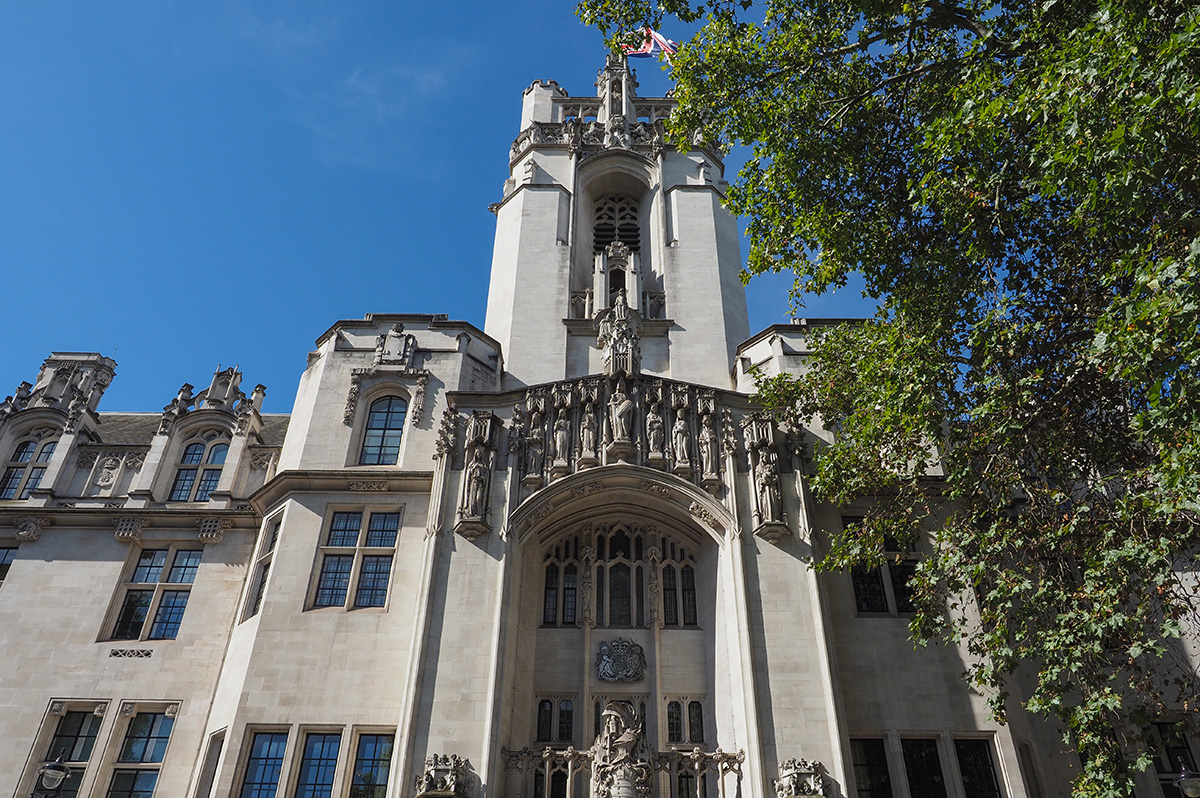
The British Supreme Court on Wednesday ruled the legal definition of a woman is limited to “biological women” and does not include transgender women.
The Equality Act that bans discrimination based on sexual orientation and gender identity took effect in 2010.
Scottish MPs in 2018 passed a bill that sought to increase the number of women on government boards. The Supreme Court ruling notes For Women Scotland — a “feminist voluntary organization which campaigns to strengthen women’s rights and children’s rights in Scotland” — challenged the Scottish government’s decision to include trans women with a Gender Recognition Certificate in its definition of women when it implemented the quota.
Stonewall U.K., a British advocacy group, notes a Gender Recognition Certificate is “a document that allows some trans men and trans women to have the right gender on their birth certificate.”
“We conclude that the guidance issued by the Scottish government is incorrect,” reads the Supreme Court ruling. “A person with a GRC (Gender Recognition Certificate) in the female gender does not come within the definition of ‘woman’ for the purposes of sex discrimination in section 11 of the EA (Equality Act) 2010. That in turn means that the definition of ‘woman’ in section 2 of the 2018 Act, which Scottish ministers accept must bear the same meaning as the term ‘woman’ in section 11 and section 212 of the EA 2010, is limited to biological women and does not include trans women with a GRC.”
The 88-page ruling says trans people “are protected by the indirect discrimination provisions” of the Equality Act, regardless of whether they have a Gender Recognition Certificate.
“Transgender people are also protected from indirect discrimination where they are put at a particular disadvantage which they share with members of their biological sex,” it adds.
Susan Smith, co-founder of For Women Scotland, praised the decision.
“Today the judges have said what we always believed to be the case, that women are protected by their biological sex,” she said, according to the BBC. “Sex is real and women can now feel safe that services and spaces designated for women are for women and we are enormously grateful to the Supreme Court for this ruling.”
Author J.K. Rowling on X said it “took three extraordinary, tenacious Scottish women with an army behind them to get this case heard by the Supreme Court.”
“In winning, they’ve protected the rights of women and girls across the UK,” she added.
It took three extraordinary, tenacious Scottish women with an army behind them to get this case heard by the Supreme Court and, in winning, they’ve protected the rights of women and girls across the UK. @ForWomenScot, I’m so proud to know you 🏴💜🏴💚🏴🤍🏴 https://t.co/JEvcScVVGS
— J.K. Rowling (@jk_rowling) April 16, 2025
Advocacy groups in Scotland and across the U.K. said the ruling is a serious setback for trans rights.
“We are really shocked by today’s Supreme Court decision — which reverses 20 years of understanding on how the law recognizes trans men and women with Gender Recognition Certificates,” said Scottish Trans and the Equality Network in a statement posted to Instagram. “The judgment seems to have totally missed what matters to trans people — that we are able to live our lives, and be recognized, in line with who we truly are.”
Consortium, a network of more than 700 LGBTQ and intersex rights groups from across the U.K., in their own statement said it is “deeply concerned at the widespread, harmful implications of today’s Supreme Court ruling.”
“As LGBT+ organizations across the country, we stand in solidarity with trans, intersex and nonbinary folk as we navigate from here,” said Consortium.
The Supreme Court said its decision can be appealed.
-

 The White House5 days ago
The White House5 days agoWhite House does not ‘respond’ to reporters’ requests with pronouns included
-

 District of Columbia2 days ago
District of Columbia2 days agoReenactment of 1965 gay rights protest at White House set for April 17
-

 Hungary2 days ago
Hungary2 days agoHungarian MPs amend constitution to ban public LGBTQ events
-

 Maryland2 days ago
Maryland2 days agoFreeState Justice: Transgender activist ‘hijacked’ Moore’s Transgender Day of Visibility event

